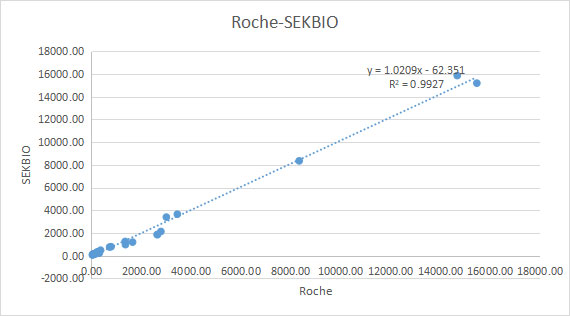N-terminal Pro B Type Natriuretic Peptide (NT-proBNP)
NT-proBNP is a product released under the pressure load of the heart, and its level can reflect the myocardial function and damage degree, which is related to the severity of heart failure. It is one of the most clinically used heart failure biomarkers.
NT-proBNP has essential value in the clinical diagnosis, risk stratification, prognosis evaluation, and curative effect monitoring of patients with acute heart failure (AHF) and chronic heart failure (CHF).
This precursor molecule is cleaved to form the active BNP and the inactive N-terminal pro-BNP (NT-proBNP) fragment. Myocardial cells secreted NT-proBNP in response to increase volume and pressure. Comparisons of BNP and NT-proBNP have shown that both eight molecules effectively diagnose left ventricular dysfunction in the acute care/emergency setting.
N-terminal Pro B Type Natriuretic Peptide (NT-proBNP) Products
| Antibody | Application |
| Sheep anti-human NT-proBNP mAb | For immunodiagnostic: ELISA, LFA, CLIA |
| Mouse anti-human NT-proBNP mAb | |
| Humanized anti-human NT-proBNP mAb |
| Antigen | Application |
| Recombinant human NT-proBNP antigen | For immunodiagnostic: ELISA, LFA, CLIA |
NT-proBNP Intro
Serum marker detection is an important means for the early diagnosis and prognosis of heart failure in clinical practice. The heart failure guidelines recommend the preferred serum markers for heart failure. Among them, natriuretic peptides (a neuroendocrine system activation marker), including brain natriuretic peptide (BNP) and amino-terminal brain natriuretic peptide (NT-proBNP), are the most popular at home and abroad (ECS/ACC/AHA/HFSA/CSC). It is recommended to use natriuretic peptides to identify high-risk heart failure groups and comprehensively manage and prevent them.
Compared with BNP, NT-proBNP has a longer half-life and better stability, so NT-proBNP has higher sensitivity for detecting early or mild heart failure, and it takes more time for blood samples to be sent to the laboratory making it possible more suitable for clinical applications.
NT-proBNP Rapid POCT Test
Because NT-proBNP has a long half-life and is relatively more stable, the specimens can be stored and detected either in the central laboratory or at the bedside using the NT-proBNP Rapid POCT test, while BNP has a short half-life and poor stability and can only be detected immediately at the bedside. NT-proBNP is slowly cleared in the blood and can accumulate at a higher concentration, reflecting the state and changes of cardiac function more sensitively to a certain extent, especially in the early diagnosis of heart failure. In addition, NT-proBNP has no physiological activity and is not affected by recombinant human brain natriuretic peptides (such as neoactivin). For patients treated with recombinant human brain natriuretic peptides, it is recommended to prefer NT-proBNP to evaluate the changes in cardiac function. BNP is cleared by binding to BNP clearance receptors neutral endonucleases, and a small part of it is emptied by renal metabolism. NT-proBNP is mainly removed by renal metabolism, so its concentration is more significantly affected by renal function than BNP.
NT-proBNP Performance Data
Manufacturer | SEKBIO |
Parameter | NT-proBNP |
Linearity | 5-30000pg/ml |
Detection limit | 5pg/ml |
Benchmark product | Roche |
Test principle and procedure | NT-proBNP: Add 20 μl of sample + 50 μl of Ra +30 μl of Rd and incubation for 15 minutes. Wash with 200 μl of washing solution. Finally, add 100 μl of A + 100 μl of B. |
Precision
Sample | RLU | Concentration | Sample | RLU | Concentration |
302.29 | 10,257 | 289.22 | 4374.48 | 441,537 | 4274.56 |
9,994 | 283.88 | 437,911 | 4248.42 | ||
9,839 | 280.71 | 424,117 | 4148.59 | ||
10,520 | 294.52 | 453,288 | 4358.98 | ||
10,602 | 296.16 | 428,601 | 4181.11 | ||
10,660 | 297.32 | 419,557 | 4115.45 | ||
10,198 | 288.02 | 444,986 | 4299.38 | ||
10,110 | 286.24 | 409,947 | 4045.36 | ||
10,820 | 300.52 | 445,647 | 4304.14 | ||
10,659 | 297.30 | 428,028 | 4176.96 | ||
AVE | 10365.90 | 291.39 | AVE | 433361.90 | 4215.30 |
SD | 329.91 | 6.66 | SD | 13523.79 | 97.84 |
CV | 3.2% | 2.3% | CV | 3.1% | 2.3% |
Limit of detection
Sample | RLU | Concentration | ||
Ag Diluent | 156 | 165 | 1.88 | 2.58 |
145 | 165 | 2.60 | 2.10 | |
143 | 118 | 2.15 | 2.10 | |
138 | 152 | 2.17 | 2.84 | |
125 | 134 | 1.16 | 2.10 | |
166 | 144 | 1.60 | 1.70 | |
129 | 121 | 2.58 | 2.10 | |
155 | 127 | 1.60 | 2.60 | |
144 | 139 | 0.23 | 2.60 | |
160 | 137 | 1.68 | 2.10 | |
AVE | 143.15 | 2.03 | ||
SD | 14.92 | 0.60 | ||
AVE+2*SD | 3.23 | |||
Linear
Sample(pg/ml) | Dilution ratio | Concentration value | Average | ||
30095.57 | 1.0 | 29812.54 | 30059.12 | 30209.24 | 30095.57 |
27086.01 | 0.9 | 26233.17 | 26171.99 | 26785.71 | 26395.57 |
24076.46 | 0.8 | 23623.09 | 23707.83 | 21225.84 | 22828.49 |
21066.90 | 0.7 | 19671.67 | 19893.97 | 17831.12 | 19118.12 |
18057.34 | 0.6 | 15081.66 | 15737.83 | 15321.30 | 16379.25 |
15047.79 | 0.5 | 14243.18 | 14338.76 | 14074.32 | 14316.57 |
12038.23 | 0.4 | 10948.01 | 10825.36 | 11440.97 | 11070.93 |
9028.67 | 0.3 | 8359.06 | 8250.77 | 7832.37 | 8147.52 |
6019.11 | 0.2 | 5527.01 | 5247.89 | 5334.36 | 5370.02 |
3009.56 | 0.1 | 2718.47 | 2651.98 | 2688.95 | 2686.51 |
0.00 | 0.0 | 0.00 | 0.00 | 0.00 | 0.00 |

Method Comparison

Reagents Stability
Reagent | Sample(pg/ml) | Average | Deviation |
2-8° | 30,000 | 4,476,786 | |
100 | 5,642 | ||
Antigen diluent | 414 | ||
calf serum | 626 | ||
random sample | 1,360 | ||
37℃ 1d | 30,000 | 4,552,605 | 1.69% |
100 | 5,591 | -0.90% | |
Antigen diluent | 444 | 7.17% | |
calf serum | 530 | -15.43% | |
random sample | 1,386 | 1.94% | |
37℃ 4d | 30,000 | 4,399,886 | -1.72% |
100 | 5,159 | -8.55% | |
Antigen diluent | 455 | 9.98% | |
calf serum | 686 | 9.47% | |
random sample | 1,602 | 17.82% | |
37℃ 7d | 30,000 | 4,264,465 | -4.74% |
100 | 5,361 | -4.97% | |
Antigen diluent | 460 | 11.11% | |
calf serum | 634 | 1.22% | |
random sample | 1,585 | 16.57% |
Calibrator Stability
Reagent | Sample(pg/ml) | Average | Deviation |
-20℃ | 30,000 | 4,541,204 | |
1,000 | 81,101 | ||
100 | 5,458 | ||
0 | 443 | ||
2-8℃ | 30,000 | 4,526,167 | -0.33% |
1,000 | 80,238 | -1.06% | |
100 | 5,657 | 3.65% | |
0 | 475 | 7.14% | |
37℃ 1d | 30,000 | 4,525,929 | -0.34% |
1,000 | 80,476 | -0.77% | |
100 | 5,617 | 2.91% | |
0 | 433 | -2.41% | |
37℃ 4d | 30,000 | 4,417,530 | -2.72% |
1,000 | 79,218 | -2.32% | |
100 | 5,115 | -6.28% | |
0 | 485 | 9.40% | |
37℃ 7d | 30,000 | 4,417,530 | -2.72% |
1,000 | 78,458 | -3.26% | |
100 | 5,226 | -4.25% | |
0 | 418 | -5.64% |


















